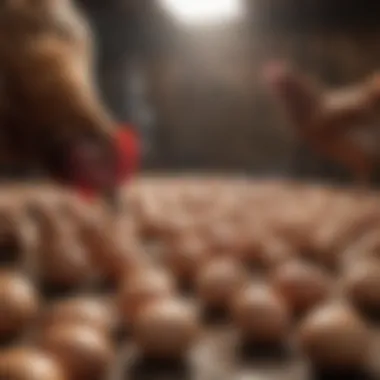Optimal Diet for Chickens to Maximize Egg Production


Intro
Providing optimal nutrition is key for chickens that lay eggs. The composition of their diet directly impacts egg production and overall health. Understanding what to feed your chickens can lead to better yields and healthier birds. This guide will explore essential diets, nutritional needs, and different food types that can help boost egg-laying.
Essential Nutrients for Egg Production
Before we dive into specific foods, it’s critical to understand that layers require several crucial nutrients to produce eggs effectively. This includes protein, calcium, vitamins, and minerals.
- Protein: Essential for muscle development and the formation of eggs, layers need a diet containing 16-20% protein. Common sources include soybean meal, fish meal, and certain grains.
- Calcium: A key element in egg shell formation, hens require about 4-5 grams of calcium per day. Crushed oyster shells, limestone, and commercial layer feed often provide adequate calcium levels.
- Vitamins: Vitamins A, D, and E are important for maintaining good health and production levels. For vitamin D, exposure to sunlight or fortified feed can make a significant difference.
Nutrition plays a foundational role in the productivity of laying hens. Ensuring a balanced diet can significantly enhance egg yield and overall health.
Optimal Feed Formulation
Creating a balanced diet for chickens often involves designing a feed mix that incorporates various food sources. It is valuable to look for commercial layer feeds that cater to the nutritional requirements. These products are usually labeled for specific age and purpose, making it easier to select.
Key Components of Layer Feed
- Grains and Seeds: Corn, barley, wheat, and sunflower seeds provide energy.
- Protein Sources: As mentioned earlier, grounds like soybean and fish meal are excellent for meeting protein needs.
- Vitamins and Minerals: Many feeds are supplemented with essential vitamins and minerals, enhancing the overall nutritional value of the feed.
Natural Supplements for Enhancing Production
In addition to standard feed, there are natural supplements that can further promote egg laying.
- Seaweed Meal: Rich in trace minerals and vitamins, it can support overall health.
- Garlic: Known for its immune-boosting properties, garlic can help keep chickens healthy.
- Apple Cider Vinegar: Often added to drinking water, it can improve digestion and promote better nutrient absorption.
Incorporating these supplements may help in maintaining the overall well-being of hens and support increased egg production.
Environmental Considerations
The environment in which chickens are kept can influence egg-laying. Factors such as housing, light exposure, and stress levels are important. Providing consistent light and a stress-free environment promotes regular laying.
- Lighting: Layers require around 14 hours of light a day for optimal production. It may be helpful to provide artificial light during darker months to meet this requirement.
- Space and Comfort: Overcrowded conditions can lead to stress. Ensure adequate space and focusing on hygiene can maximize productivity.
Epilogue
Intro to Chicken Nutrition
Nutrition is a fundamental aspect of raising chickens, especially those intended for egg production. An understanding of chicken nutrition allows poultry keepers to provide the necessary dietary components that hens require for optimal health and performance. This section will delve into two critical areas: the importance of diet and the basic nutritional requirements that underpin egg-laying efficiency.
Understanding the Importance of Diet
A hen's diet directly influences her ability to lay eggs consistently and healthily. Feeding chickens a balanced diet is crucial for maximizing their egg production and overall vitality. Proper nutrition supports various biological functions, including reproductive health, immune system strength, and growth. Moreover, an adequate diet ensures that hens can cope with environmental stressors, enhancing their adaptability.
Notably, the right nutrients can also help in reducing common issues such as egg deformities and poor laying habits. Chicken owners who prioritize diet will likely see improvements not only in egg quality but also in the overall welfare of their flock.
Basic Nutritional Requirements
Chickens require a carefully balanced diet that includes several essential nutrients:
- Proteins - Necessary for tissue repair and growth. They are a vital building block in the production of eggs.
- Carbohydrates - Provide the chicken with energy. This energy is crucial for overall activity, including egg production.
- Fats - Offer a concentrated source of energy and are important for the absorption of fat-soluble vitamins.
- Vitamins and Minerals - These are essential for various bodily functions, including reproduction. For instance, calcium is vital for shell formation, and vitamin D supports calcium absorption.


Hens also need a consistent supply of clean, fresh water to maintain hydration and support metabolic processes. By understanding these basic nutritional requirements, chicken owners can formulate a diet that promotes health and productivity within their flocks. It is essential to regularly evaluate and adjust their feed based on these needs and the hens' life stages.
Key Nutrients for Egg Production
Understanding the key nutrients essential for egg production is crucial for anyone involved in poultry farming. The quality of the eggs and the health of the hens largely depend on a balanced intake of nutrients. Research shows that birds that are fed a nutrient-rich diet not only lay more eggs but also produce eggs with better shell quality and nutritional value. It is important to address specific nutrients that directly impact egg-laying efficiency and overall hen health.
Protein's Role in Egg Laying
Protein is fundamental for hens, particularly in the egg-laying phase. It serves as the building block of body tissues, aids in the formation of eggs, and supports metabolic functions. Hens typically require a protein intake of about 16-20% in their diet. A higher protein diet encourages more egg production and can improve the size of the eggs. Common sources of protein for laying hens include soybean meal, canola meal, and dried distillers grains. Chicken owners might want to monitor their hens’ behavioral changes such as egg numbers and vigor, which can indicate if their protein levels are adequate.
The Significance of Calcium
Calcium is another critical nutrient that affects egg production, particularly shell quality. Hens need a sufficient amount of calcium to form strong eggshells, which often equates to around 3.5 grams of calcium per egg produced. An inadequate calcium supply can lead to thin-shelled or even shelled eggs. Calcium sources like limestone, crushed oyster shells, and certain leafy greens can be incorporated into their diet to meet these needs. Moreover, it is essential to balance calcium with phosphorus, as too much of one can interfere with the absorption of the other. Therefore, ensuring a balanced mineral ingestion is vital.
Vitamins Essential for Hens
Vitamins play a diverse role in improving the health and productivity of laying hens. Specific vitamins such as A, D3, and E are known to enhance reproductive performance. Vitamin D3, for example, is critical for calcium absorption and overall bone health. Vitamin A supports vision and immune function, which is necessary for overall well-being. Therefore, a fortified feed containing essential vitamins can enhance overall egg production and improve the vigor of the hens. Some natural sources of vitamins can be found in fruits and leafy vegetables, but commercial feeds often provide these necessary nutrients in a well-balanced manner.
The Value of Carbohydrates and Fats
Though often overlooked, carbohydrates and fats also contribute to the energy needs of laying hens. Carbohydrates serve as a primary energy source, which is essential for daily activities and metabolic processes. Fats, meanwhile, not only provide energy but are vital for the absorption of fat-soluble vitamins. Hens typically require lower levels of fat, around 2-4% of their diet, but this can vary depending on their growth stages and laying status. Incorporating grains such as corn and barley will satisfy their carbohydrate needs, while vegetable oils can be a source of healthy fats. Striking a balance will help maintain good energy levels in hens required for sustained egg production.
Remember: Optimal egg production hinges on a proper understanding of these nutrient needs. Adjustments in diet can have profound effects on hen health and productivity.
Commercial Feed Options
Commercial feed options play a crucial role in optimizing egg production among laying hens. These feeds are specifically formulated to meet the distinct nutritional needs of chickens, ensuring they receive the right amount of proteins, vitamins, and minerals essential for egg laying. There are various commercial feed types available, and selecting the right one can greatly affect the health and productivity of your flock.
Layer Feed Formulations
Layer feed is designed for hens nearing the age of egg production. These formulations typically come in pellet or crumble form and are rich in protein, calcium, and other crucial nutrients. The protein content usually ranges from 16% to 18%, and calcium levels are generally around 3.5%. Calcium is vital as it helps in the formation of strong egg shells.
Using a high-quality layer feed can lead to a noticeable increase in egg yield. In addition, some formulations might include specific additives like probiotics or prebiotics that support gut health and digestion. Here are some key things to consider when choosing layer feed:
- Ingredient Quality: Look for feeds with natural ingredients. Avoid feeds with fillers that do not contribute to the chickens’ health.
- Grain Source: Corn and soybean meal are common ingredients. Ensure the feed contains high-quality grains.
- Additives: Check if the feed has supplements for vitamins, particularly Vitamin D3, which aids in calcium absorption.
Opting for layer feed will provide a balanced diet that supports sustained egg production throughout the laying period.
Impacts of Feed Quality on Production
The quality of feed directly influences the productivity and health of laying hens. Low-quality feeds can lead to poor egg quality and lower production rates. Plus, subpar diets might result in nutritional deficiencies, causing health issues like weak shells or reduced laying frequency.
High-quality feed enhances egg output and ensures overall hen health, which is essential for poultry keepers aiming for optimal egg production.
When assessing feed quality, consider the following aspects:
- Nutrient Profile: A well-balanced feed should list its nutritional content clearly on the packaging. Always verify if the feed meets the specific needs of laying hens.
- Freshness: Ensure you purchase feed that is fresh. Old feed can lose its nutritional value and become less effective.
- Formulation Changes: Many companies periodically update their formulations based on new research. Be sure to stay informed about the latest offerings.
In summary, selecting high-quality commercial feed significantly enhances the odds of optimal egg production in chickens. It is essential to approach feeding practices with informed decision-making to secure the health and productivity of your hens.
Natural and Supplementary Foods
Natural and supplementary foods play a vital role in enhancing egg production in chickens. The right selection of these foods can provide essential nutrients that commercial feeds alone might not fully satisfy. These foods not only contribute to the health of laying hens but also affect their overall productivity. Incorporating diverse food sources can lead to stronger birds, improved egg quality, and, ultimately, a more sustainable farming practice.


Whole Grains and Seeds
Whole grains and seeds are fundamental components of a chicken's diet. They provide a rich source of energy, primarily due to their high carbohydrate content. Grains such as corn, oats, and barley can be mixed to create a balanced diet. Seeds like sunflower seeds are particularly beneficial as they are packed with essential fatty acids and protein. These nutrients positively impact egg production and contribute to the general health of the flock.
Additionally, whole grains promote better digestion when consumed in their natural form. The physical structure of the grains encourages hens to peck and scratch, stimulating their natural behaviors and leading to a more fulfilling life in their environment.
Fruits and Vegetables
Fruits and vegetables should not be overlooked when considering a nutritious diet for chickens. These foods add variety and contain numerous vitamins and minerals that play a key role in overall health and egg production. For example, leafy greens like spinach and kale are excellent sources of vitamins A and K. Carrots provide beta-carotene, which can improve egg yolk color. Likewise, fruits such as bananas and berries can serve as treats but should be given in moderation due to their sugar content.
Offering a mix of fruits and vegetables encourages hens to engage with their diet and can also reduce waste. Chickens are known to enjoy foraging, and this practice helps enhance their mental stimulation. Always ensure that any fruits and vegetables are fresh and thoroughly washed to avoid pesticide residues.
Mealworms and Other Protein Sources
Protein is crucial for egg-laying hens, and mealworms serve as an excellent supplementary protein source. These insects are high in protein and are a favorite among chickens. They contribute to muscle development and maintenance, which in turn helps in forming eggs. Other protein options include insects such as crickets or black soldier fly larvae. Whatever source you choose, it’s vital to ensure it is safe and free from harmful additives.
Providing protein from natural sources not only enhances the nutritional profile of the diet but also enriches the chickens' feeding experience. Hens that are engaged in their feed are often more productive, which is a benefit for those raising chickens for egg production.
Using a combination of natural and supplementary foods can significantly enhance the health and productivity of your laying hens. Balance is key to ensuring they receive all necessary nutrients.
By incorporating these natural options into the diet, chicken owners can create a more holistic approach to poultry nutrition. Not only does this promote egg production, but it fosters an environment where chickens can thrive.
Feeding Practices for Optimal Results
Feeding practices significantly impact the egg-laying performance of chickens. Proper feeding ensures that hens receive optimal nutrition, promoting healthy growth and consistent egg production. Understanding how to effectively manage feeding routines can make a substantial difference in the overall well-being of your flock.
Frequency and Amount of Feeding
The frequency and amount of feeding are critical in establishing a successful laying regimen. Chickens should generally be fed two to three times a day. This consistent schedule helps regulate their digestive systems. Each hen typically consumes about 0.25 to 0.5 pounds of feed daily.
- Consistency is Key: Regular feeding times create a sense of routine for the hens, encouraging them to eat at optimal times.
- Watch for Waste: If the hens leave excess food, it may indicate overfeeding or low-quality feed. Adjust the amount according to their behavior and appetite.
- Grain-based Options: Incorporating a mix of grains like corn and wheat can entice hens and improve feed intake.
In addition to adjusting the frequency, it’s essential to observe your hens. Healthy chickens display lively behavior and a strong appetite. If you notice reduced consumption, you may need to check their health status or stress factors in their environment.
Age and Breed Considerations
The age of your chickens directly influences their dietary needs. Pullets, young hens that haven't started laying yet, require special feed formulations to support their growth before they start laying eggs.
- Layers vs. Broilers: Laying hens benefit from higher calcium and protein levels, while broilers focus on weight gain. Ensure your feed matches the breed's requirements.
- Adjusting for Maturity: As hens age, their nutritional needs evolve. Older hens often require diets that support health and consistent egg production.
Different breeds also exhibit distinct feeding preferences. For example, heritage breeds may forage more actively than commercial layers. Therefore, paying attention to both age and breed ensures that your feeding practices align with the natural tendencies and needs of your chickens.
"Understanding the differences in age and breed helps you tailor a specific feeding strategy, maximizing laying performance."
By focusing on feeding routines, you can enhance egg yield and ensure the well-being of your flock.
Environmental Influences on Egg Production
Understanding environmental influences is crucial for optimizing egg production in chickens. Housing conditions, light management, and temperature control play significant roles in the health and productivity of laying hens. Addressing these factors can lead to increased egg yield, better egg quality, and improved overall well-being of the flock.
Impact of Housing Conditions


A well-designed housing environment is fundamental for chickens. It affects their behavior, health, and ability to lay eggs consistently. Chickens require adequate space to move freely. This allows them to express natural behaviors, which reduces stress. Poor housing leads to aggression, pecking, and lower egg production.
The flooring in chicken houses should be comfortable and safe. Many choose bedding such as straw, wood shavings, or sand. These materials absorb moisture and provide comfort. Proper ventilation is vital, as it helps manage odors and temperatures. Insufficient airflow can lead to respiratory problems and increased stress levels in hens.
In addition, cleanliness within the housing is key. Regular cleaning prevents disease outbreaks and promotes a healthy living space. Ensure nesting boxes are cozy and accessible. They should be placed away from the main feeding area to encourage hens to use them. Resulting calm nesting behavior contributes positively to egg production.
Role of Light and Heat Management
Light is a critical factor in regulating laying cycles among chickens. Hens need about 14 to 16 hours of light each day to maintain optimal egg production. This light can come from natural sunlight or artificial sources. Many farmers choose to use specific lighting systems that mimic natural conditions. This encourages more stable laying patterns, as well as improved egg quality.
Heat management is equally important. Chickens are sensitive to extremes in temperature. High heat can stress hens, leading to a drop in egg production. Providing shaded areas is essential during hot months. Conversely, during colder periods, ensure they have enough warmth. Insulation in housing can help maintain a consistent temperature.
In summary, managing the environmental conditions for chickens is vital. Both housing quality and appropriate light and heat levels affect egg production rates. Ensuring that chickens live in a healthy, balanced environment translates to better egg yield and overall flock health.
Proper environmental management is not just a matter of comfort; it's a primary factor for achieving maximum egg production.
Seeking more information? You can check resources at Wikipedia, Britannica, Reddit, and Facebook.
Health Factors Affecting Egg Laying
Understanding health factors is vital for those looking to optimize egg production in their chickens. The overall health of hens greatly influences not only their ability to lay eggs but also the quality of those eggs. Poor health can lead to decreased productivity, which can be frustrating for chicken owners. Therefore, being aware of these factors allows for better management practices and enhances the sustainability of poultry farming.
Common Health Issues in Laying Hens
Laying hens face various health challenges. Identifying these issues early can prevent long-term consequences that could affect egg production. Some common health issues include:
- Infectious Diseases: Illnesses like avian influenza and coccidiosis can severely hamper egg production. These diseases may spread quickly within flocks if not controlled.
- Parasitic Infections: External parasites such as mites and lice or internal parasites like worms can lead to stress and nutritional deficiencies, impacting egg laying.
- Nutritional Deficiencies: Lack of essential nutrients such as vitamins and minerals can lead to poor health in hens. For example, calcium deficiency can result in weak eggshells, hence affecting the quality of the eggs.
Being vigilant about these issues ensures that laying hens remain productive.
Preventive Measures and Health Monitoring
Taking preventive measures is essential to maintain the health of hens and their productivity. Implementing a comprehensive health monitoring strategy includes the following practices:
- Regular Health Check-Ups: Routine veterinary visits can help identify health issues before they escalate. Early detection of diseases can protect the flock from widespread contamination.
- Balanced Diet: Offering a nutritionally complete diet minimizes health risks. Incorporate feeds high in protein and calcium which are essential for egg production. An appropriate blend of commercial and natural feeds also plays a crucial role in hen health.
- Clean Housing: Keeping living environments clean reduces the likelihood of disease outbreaks. Proper sanitation practices help eliminate pathogens that may affect health and productivity.
- Vaccination: Immunizing your birds against common diseases can provide added protection and safeguard against potential outbreaks.
Regular health monitoring and preventive actions enhance the productivity of laying hens, leading to improved egg yields and overall flock well-being.
Monitoring health should be an ongoing process. Keeping a record of health issues, treatments, and responses can refine feeding strategies and housing conditions. Ultimately, attention to health factors will contribute significantly to the ability of hens to produce eggs consistently.
Culmination and Recommendations
The importance of focusing on optimal nutrition for laying hens cannot be overstated. In this article, we laid out the critical components of a diet that supports egg production. Quality feed, balanced nutrients, and appropriate environmental conditions all play significant roles in enhancing productivity.
Key Takeaways for Chicken Owners
While raising hens can be rewarding, understanding their dietary needs is paramount. Here are some key points to keep in mind:
- Balanced Diet: Ensure that chickens receive a variety of foods rich in protein, calcium, vitamins, and healthy fats.
- Quality Feed: Choose commercial layer feeds specifically formulated for egg production. These feeds contain the appropriate mix of nutrients to support egg health.
- Natural Supplements: Incorporate whole grains, seeds, fruits, and vegetables into the diet. These are excellent for both nutrition and hen interest.
- Health Monitoring: Regularly check hens for signs of illness and ensure they are gaining weight appropriately. This can influence their laying capabilities.
Future Considerations for Poultry Nutrition
As we advance, the landscape of poultry nutrition is evolving. Here are several considerations for the future:
- Research Expansion: Continue to explore the impacts of alternative feed sources and dietary supplements. This knowledge can optimize health in both short and long term.
- Sustainability Practices: Focus on implementing sustainable farming practices. This can enhance not only egg production but also environmental health.
- Technological Advances: Adapt technology in monitoring feed intake and health status of laying hens. Smart farming techniques may yield better insights into hen productivity.
Understanding nutrition is not just about egg quantity, it's about promoting the overall well-being of the hens. This approach can lead to healthier birds and improved egg production long-term.
By keeping these key takeaways and future considerations in mind, chicken owners can make informed decisions that optimize not only egg production but also the health and longevity of their flocks.







